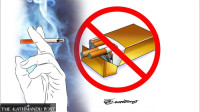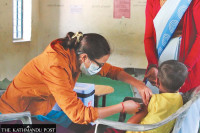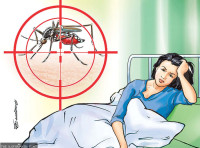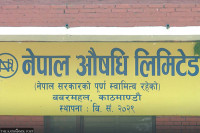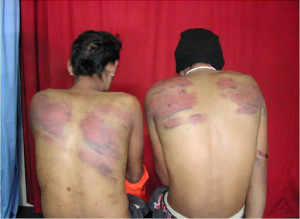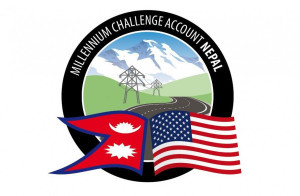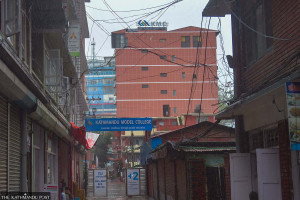National
Covid enters Nepal as cases spike in India
Rapid tests by Kailali health officials confirm Covid in three India returnees. Test kits in short supply.
Arjun Poudel
Nepal on Thursday confirmed new cases of coronavirus infection.
According to the Epidemiology and Disease Control Division, three people—two males and a female—who returned from India on Wednesday, tested positive for Covid.
The returnees, from Kanchanpur, Achham, and Kailali districts, have fever, cough, and other Covid-like symptoms, They were tested at the Trinagar border point in Kailali district using rapid diagnostic kits.
“Yes, three people—two males and a female—who returned home from India have tested positive for coronavirus,” said Hem Raj Joshi, Covid focal person at the Health Directorate of Sudurpaschim province. “Even though they have fever and other symptoms of coronavirus, their health is normal. We have asked them to remain in isolation for a week.”
India has been witnessing a spike in coronavirus cases. On Thursday, the Union Ministry of Health and Family Welfare of India reported seven deaths and 564 new infections in the previous 24 hours. The number of active coronavirus cases has reached 4,866. Since January this year, 51 people have succumbed to the virus.
The southern neighbour has also confirmed the emergence of four new sub-variants of omicron—NB.1.8.1 and LF.7, XFG and JN.1.
Along with India, several other countries including Singapore, Thailand, China (Hong Kong), and the US have also reported a surge in coronavirus cases.
The World Health Organisation has classified NB.1.8 subvariant as a variant under monitoring. The UN health body said that the additional public health risk posed by NB.1.8.1 is evaluated as low at the global level as per the available evidence.
“Despite a concurrent increase in cases and hospitalisations in some countries where NB.1.8.1 is widespread, current data do not indicate that the variant leads to more severe illness than other variants in circulation,” reads the WHO statement.
Experts in Nepal say that even if the new variant of coronavirus is mild, elderly people and those with underlying conditions remain at risk of developing severe symptoms.
They had earlier warned that the Covid could enter the country at any time due to geographic proximity with, and the movement of people, from countries that are seeing a spike in infections. The country in the past witnessed Covid outbreaks shortly after spikes in other countries.
“We have informed all relevant agencies, including those under the Ministry of Health and Population, about the positive cases,” said Joshi. “We have also requested an urgent supply of rapid diagnostic test kits.”
According to officials, the Health Directorate currently has only 90 rapid diagnostic test kits in stock, which is insufficient to carry out testing in a health desk during a massive surge in positive cases. They added that such a surge cannot be ruled out, given the daily entry of thousands of migrant workers returning from India.
Meanwhile, officials at the Epidemiology and Disease Control Division said they are aware of Covid-positive cases being detected through rapid diagnostic tests at the border points.
“We have asked the health agency concerned to send swab samples of an infected person to Kathmandu,” said Dr Chandra Bhal Jha, director of the division. “We will conduct polymerase chain reaction [PCR] tests on those swab samples for further confirmation.”
When asked about the shortage of test kits at the health desks and health facilities, Jha said the central store has a limited stock, and that any immediate supply would be quickly depleted if cases rise significantly.
“We have requested the Management Division under the Department of Health Services to procure 20,000 rapid diagnostic test kits,” said Jha. “Along with this, we have also requested the World Health Organisation Nepal office for rapid diagnostic test kits.”
Public health experts say a Covid outbreak could hit Nepal soon, as cases are sharply rising in neighbouring India. In the past, it has usually taken two to three weeks for the virus to spread to Nepal after a surge in India.
They have called on health authorities to step up surveillance measures, including testing patients with influenza-like symptoms. The public, they say, should return to the basics—wearing face masks, washing hands and avoiding crowds to cut down on infection risk.




 21.95°C Kathmandu
21.95°C Kathmandu


